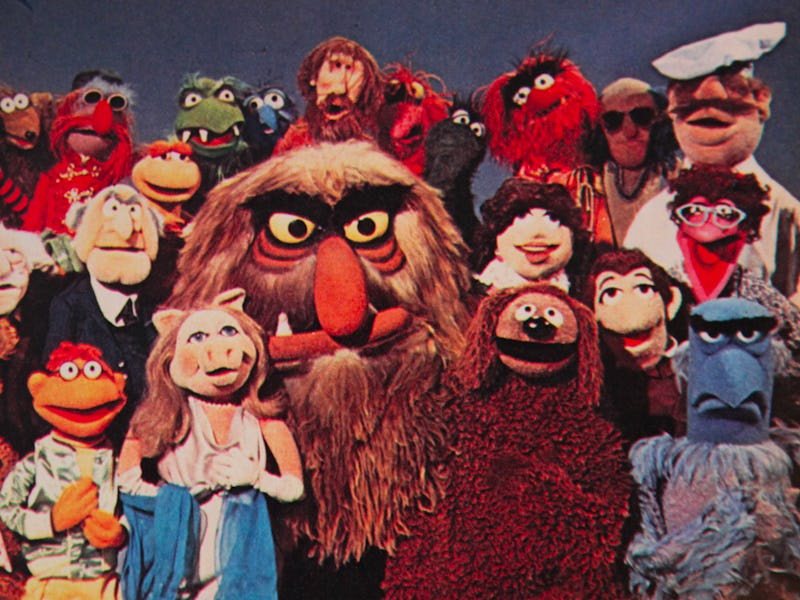ABC Isn't Doing the Muppets Any Favors, but They Still Matter
To understand why their new show doesn't work, you have to know where America's most pieces of felt come from.

Unlike Saturday Night Live, a show made by high people for sober people, The Muppet Show was a show made by sober people for the profoundly impaired. This is neither reductive nor insulting. The year after The Muppets debuted alongside Belushi on the first season of Lorne Michael’s sketch comedy clusterfuck, they moved to England to headline their own show, which was, not incidentally, about putting on a show very much like Saturday Night Live.
Where SNL used rumors of drug use and behind-the-scenes chaos to help brand itself to young, presumably mustachioed boomers obsessed with authenticity, TMS put fake behind-the-scenes chaos at the heart of a show about stressed out pieces of felt. SNL was exciting because it felt real. TMS was exciting because it felt genuine.
ABC’s The Muppets doesn’t foster that feeling.
Over the last forty years, Muppets have sold Toyotas, Polaroids, and iced tea and had countless comebacks. They are archetypal show business types, never ready to relinquish the spotlight. But, unlike the myriad other boomer entertainers and thinkers and writers and pundits who have refused to exeunt stage left, the Muppets still seem anchored in the seventies in a good way. The Muppets are boomer figures, but they’re not purveyors of identity politics or social stagnation. They don’t want us to either question or embrace authority because their motivations are simpler than that: Kermit wants things to be organized; Piggy wants love; Gonzo wants to get a laugh; Animal wants to hit stuff with sticks.
The Muppets are like dogs, deeply emotional and dumb in a relatable way. They model the extremely cool idea of accepting people as they are that came out of the hippie movement without modeling that movement’s messy politics.
Rowlf the Dog, who is very, very doglike, is probably the Muppet that best exemplifies why this merry band of misfits has aged so well. When the first episode of The Muppet Show aired, Rowlf was already over a decade old. He debuted on Purina dog food commercials in the early sixties and spent some time on Sesame Street. Once the show for adults started, he was in everything, but always in a bit role. Rowlf is famous (well, famous enough to have put out an album), but he’s really just a piano player. The reason Rowlf is recognizable is that he’s recognizable. Sure, he’s a puppet dog, but he’s also every small-time entertainer you’ve ever met. He’s just happy to have a steady gig. The craziest thing about Rowlf is how un-crazy his character is.
But if the Muppets are recognizable as archetypes, then why do they occupy such a singular place in our popular culture?
Because there are a lot of them. Yes, the Muppets model acceptance, but they also model the human psyche. The Muppet Show was a proto-Inside Out, a meditation on the parts that make up a psychological whole. Their characteristics don’t overlap because they need to congeal as an individual. The Muppets are most commonly referred to and thought of as a collective because their sum is equal to considerably more than their parts. Their sum is an everyman protagonist, a sort of crowdsourced technicolor Tom Hanks.
This is still true on the current iteration of The Muppets, which feels a bit like something filmed and mothballed seven years ago only to be dusted off by new network brass. The Muppets still want to put on a show and that’s as it should be, but the show’s desire to make Kermit and Fozzie and Miss Piggy into well-rounded individuals is at cross purposes with the Muppet-iness of the thing. Gonzo may be searching for a star turn, but it’s foolish to give him one.
The new show brings the crew closer to its SNL roots and that’s a major part of why it feels so tired. The Muppets feel a bit too old for this shit. They should be watching NCIS, not trying to star in a TV show. It’s undignified for this atomized hippie, this collective being, to keep chasing relevance. The Muppets still matter in the same way that boomers still matter. They’re important, but they don’t belong at the center of things any more. They can maybe calm down a bit and spend some time learning to live more comfortably with each other. They can let someone else put on a show for a change.